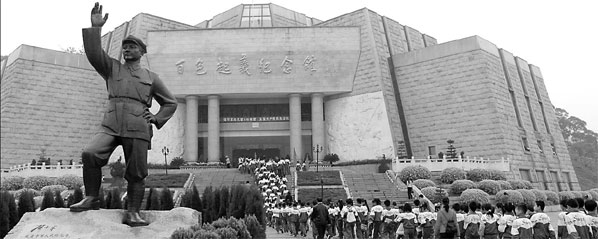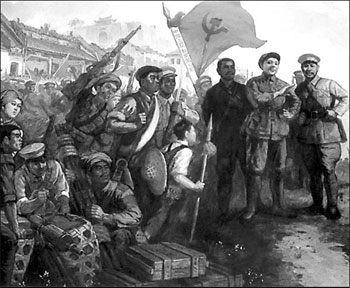
The statue of Deng Xiaoping stands in front of the Baise Uprising Museum, which reflects the city's important role in China's modern history.File photos
Baise's top official Liu Zhengdong is a man on a mission. Get him talking about his ward - the remote city of Baise in South China's Guangxi Zhuang autonomous region - and he's almost breathless detailing his plans.

Booming industries have helped the city's GDP grow by 15 percent last year.
But the 49-year-old former farmer hasn't always been this upbeat about Baise. Back in 2004, when he was looking for a change and joined the cadre dispatch program, he had thought he would finally be able to bid adieu to poverty and scenes of hunger or at least be in a place nowhere near as poor as his hometown, Sichuan.
Even though he knew that the program would take him to Guangxi, Liu took it for granted he would be offered either the booming capital Nanning, picturesque Guilin, or any other "decent" place to commensurate with his rank and performance in Beijing.
After all, by 2004, Liu had worked in Beijing for eight years, and had risen to the rank of bureau chief of the Chinese People's Political Consultative Conference, the country's top political advisory body.
Much to his chagrin, his destination was Baise, one of the poorest cities in Guangxi. The city's main claim to fame is that Deng Xiaoping - chief architect of China's reform and opening-up - orchestrated an uprising there in 1929.

Beautiful landscape makes Baise a magnet for tourists from home and abroad.
"Baise is underdeveloped partly because there is a severe scarcity of farmland," Liu says, citing a popular joke about a farmer who bragged to a friend about his share of cropland, consisting of 365 small patches. They counted and counted but only came up with 364; the last piece, they finally found, was hidden under his hat.
But Liu was quick to see the city's advantages. The first is its location. Baise has a waterway going directly to Guangzhou, and is a gateway to Vietnam and the rest of the Association of Southeast Asian Nations (ASEAN).
Baise's border with Vietnam stretches 360.5 km, and its investment in infrastructure was restrained by several wars with its neighbor in the 1970s and 1980s.
Now peace has settled, central authorities want to improve living conditions by turning the former revolutionary base into a growth engine.
In addition, Baise is one of China's most important producers of aluminum. Its reserves exceed 1 billion tons, accounting for one-fourth of the country's total. Baise is also Guangxi's third biggest producer of hydropower, supplying the power grids of Guangdong and Hong Kong.
"It is time for Baise to go all out and play catch-up," says Liu.

A painting depicting the Baise Uprising which was orchestrated by Deng Xiaoping (second from right) in 1929.
And Liu certainly knows how to help this process along.
To ministry delegations from Beijing, Liu expatiates on Baise's revolutionary past while pointing to its relatively low priority in the national economic agenda. To business missions from the affluent eastern coastal areas or abroad, Liu dwells on the region's ample power, natural gas, oil and other resources.
To journalists, Liu just spells out his 10 Chinese characters that he uses to describe Baise - such as "mountainous", "boundary", "ancient" (for its 800,000 years of history), "white" (for its bountiful aluminum ores) and "green" (for its tropical organic farm produce and tourism) - and asks them to explore further.
"Guilin, a city known for its beautiful karst scenery, may be compared to a woman clothed in ornaments; but Baise is more like a country girl endowed with dazzling beauty, with plenty of natural resources, fresh air, unpolluted environment, and simple and honest people," Liu likes to tell visitors.
"You can't talk much to people with a tight schedule, or at a banquet, but you have to impress them in the time available to get their best support," he says. "A good conversationalist can engage his audience, arousing interest and involvement."

About 87 percent of the city's 3.8 million population belong to the ethnic minorities.
Liu sees great prospects for Baise. He believes the city's expansion will accelerate in the years to come as the State Council - China's Cabinet - has just approved the Guangxi's Beibu Gulf Economic Zone development strategy, which will develop the zone into a base for coastal industries and for cooperative ventures in logistics, commerce and trade, as well as in information exchange, between China and ASEAN.
"My experience accumulated in both rural areas and in Beijing has helped me a lot," says Liu. "I know how to 'sell' a project to a foreign businessman, or how to repackage a development scheme so as to attract support from the central government."
Speaking of experience, Liu has plenty of that. He has been a farmer, a militia company chief, a driver and a high school teacher. At the national college entrance exam he scored the highest marks to enter a teachers' university.
But Liu found none of these career paths fulfilling and took a new road when he was 26. He enrolled at the Central Party School in Beijing for a Master's degree in China's social and political reform in 1985, before taking on many jobs ranging from a political researcher to a secretary. In the ensuing years, he advised provincial leaders in Chengdu of Sichuan province, and eventually moved to Beijing to serve top policy makers. But these still were not enough to pave the way for a mayoral position and in February promotion to Party Secretary - even for a remote city such as Baise.
Each year, hundreds of officials in Beijing and other municipalities are dispatched to work at grassroots offices in less developed regions such as Guangxi for a year or more, to ground these "promising cadres" in the solid and sometimes somber realities.
While in Beijing, Liu made a mark with his brilliant insight into ways to narrow China's regional disparities. He also established extensive relations at various central government departments.
All of this came to his aid when he traveled Baise, leaving no stone unturned in locating and promoting the city's advantages.
For example, Liu is proposing the central authorities designate Baise as a "pilot city" for resource development. The purpose is to blaze a new trail in terms of how an ethnic minority region - 87 percent of the city's 3.8 million population belong to the ethnic minorities - can make the best use of its natural resources with policy support.
Under the proposal, the city will be given preferential policy treatment that will allow it to retain more of the income tax derived from mining and manufacturing for its own use, thus boosting Baise's deep-processing industries. So far, the city has been selling its raw materials at very low prices.
"This (the proposal) will help maximize our resources advantage and create more jobs," says Liu.
One thing Liu is proud of in his four years in Baise is that the city's annual revenue reached 5 billion yuan ($667 million) last year, ranking fourth among the dozens of cities in Guangxi. Baise has also been chosen as a national top tourist destination.
(Xinhua News Agency June 9, 2008)